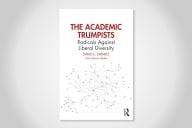You have /5 articles left.
Sign up for a free account or log in.
A teaching academy might not be the first place university administrators think of when they have money to invest in new projects -- but it might be one of the first places that they look to cut during lean years.
The Teaching Academy at New Mexico State University has come up with an innovative model in the era of the ever-contracting budget: donations from faculty members. This year, faculty members at the university raised about $27,000 for the academy, making up 30 percent of the unit’s operating budget.
“We wanted it to be like the public radio model. We offer free services to faculty and staff, and this was an opportunity to give back,” said Tara Gray, director of the teaching academy. “I feel it makes the university a more vibrant community. “People feel they are investing in something they are a part of.”
This year, 115 faculty members (out of a total of 675) and some staff donated to the academy, thus raising the most money in any one year since the academy started soliciting donations. The Teaching Academy now offers 10,000 hours of courses to faculty members from the university and Dona Ana Community College, which is located nearby. Gray said raising money helps other faculty members be better teachers, and they, in turn, might be able to help generations of students over their careers.
“Getting funding can be a challenge. When budgets are tight, it is easy to cut a faculty development program because it might not seem central to the university, especially at research universities,” said Dee Fink, former president of the POD Network in Higher Education, an organization that seeks to improve teaching and learning in postsecondary education, and founding director of Instructional Development Program at the University of Oklahoma. Even at smaller liberal arts colleges that focus on teaching, Fink said, administrators might not always be convinced of the need for faculty development. “While they value teaching, they might feel that their teachers are already very good,” he said.
At New Mexico State faculty members have been enthusiastic because they say it improves the morale of the teaching staff and makes their skills stronger, and many have been making donations ranging from $10 a month to $100.
Liz Ellis, chair of the finance department, said she was initially skeptical of giving money to the academy. “There are lots of units here that want us to give back. A lot of faculty members have not been happy about that, and I shared their feelings to a certain extent,” Ellis said.
She changed her mind when she realized that many universities promote research actively but do not give as much support to training faculty members how to teach. “The Teaching Academy is worth it because it provides great service and actual tools to develop better teachers. At the academy, one could learn about how to reach out to first-generation college students or how to try and increase the attention span of students,” she said.
Popular programs include one where faculty members learn how to save time in the classroom and make classes more interesting by not following the “lecture-textbook” model and another course where faculty, staff and students learn about gay issues. Workshops on assessment benchmarks and standards, and team-based learning have also been offered.
Muhammad Dawood, an associate professor of electrical engineering at the university, who has spent scores of hours at the teaching academy since 2005, said he had made “token contributions” over the years. “I have grown and benefited as a teacher, and I want other faculty members, especially younger faculty members to have the same advantage,” he said. Dawood said the academy helped him focus on students individually as opposed to treating them as a monolithic group.
Other faculty members voiced similar thoughts, citing budget challenges as one of the main reason they decided to donate. “Non-academic units tend to suffer first; this would give the academy a little more autonomy,” said Martha Mitchell, a professor who heads the chemical engineering department at the university.








